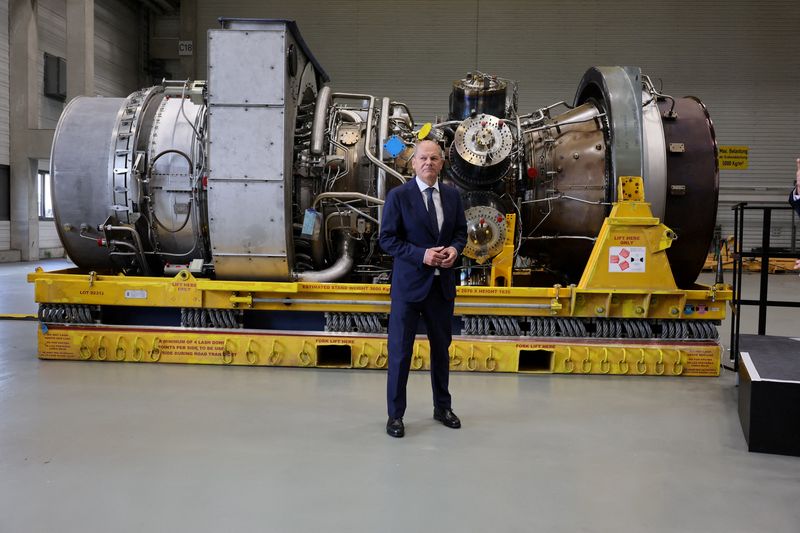‘The turbine works’: Germany’s Scholz points finger at Russia in energy row
2022.08.03 13:29
5/5

German Chancellor OIaf Scholz stands next to a gas turbine meant to be transported to the compressor station of the Nord Stream 1 gas pipeline in Russia during his visit to Siemens Energy’s site in Muelheim an der Ruhr, Germany, August 3, 2022. REUTERS/Wo
2/5
By Christoph Steitz
MUELHEIM AN DER RUHR, Germany (Reuters) -German Chancellor Olaf Scholz on Wednesday said Russia had no reason to hold up the return of a gas turbine for the Nord Stream 1 pipeline that had been serviced in Canada but has since been stranded in Germany in an escalating energy standoff.
Standing next to the turbine on a factory visit to Siemens Energy in Muelheim an der Ruhr, Scholz said it was fully operational and could be shipped back to Russia at any time – provided Moscow was willing to take it back.
The fate of the 12 metre (13 yard) long turbine has been closely watched as European governments accused Russia of throttling gas supplies on spurious pretexts in revenge for Western sanctions after the invasion of Ukraine in February.
Moscow denies doing so and cited issues with the turbine as the reason for lower gas flows through Nord Stream 1, which have been cut to 20% of capacity.
The turbine’s movements had been shrouded in secrecy and its whereabouts unknown until Tuesday evening when the chancellor’s visit to Siemens Energy was announced.
“The turbine works,” Scholz said, telling reporters that the point of his visit was to show the world that the turbine worked and that “there was nothing mystical to observe here”.
“It’s quite clear and simple: the turbine is there and can be delivered, but someone needs to say ‘I want to have it'”.
Even if Russia took back the turbine, Scholz warned that Germany could face more disruptions further down the line and that supply contracts might not be honoured.
A senior manager at Kremlin-controlled Gazprom (MCX:GAZP) said last week that the delivery of the turbine after servicing was not in line with the contract and that it had been sent to Germany without Russia’s consent.
Standing next to Scholz, Siemens Energy CEO Christian Bruch confirmed that there were ongoing talks with Gazprom, “but no agreement”.
Collapsing gas supplies and rocketing prices have sparked recession warnings for the Germany economy, Europe’s largest, and raised fears of energy shortages and rationing going into winter.
After being forced to bail out the utility Uniper when it became an early casualty of the gas crisis, Scholz’s government will have to amend newly introduced energy reforms after they ran into problems, sources told Reuters on Wednesday. [L8N2ZF314]








